
Nauplius
metrics 2024
Connecting Researchers in Crustacean Conservation
Introduction
Nauplius is a reputable open access journal dedicated to the field of carcinology, published by the Sociedade Brasileira de Carcinologia. With a commitment to the dissemination of research on crustaceans, the journal focuses on various aspects of their biology, ecology, and conservation. Since its establishment, Nauplius has fostered a global community of researchers and scholars, providing a platform for the sharing of innovative findings and the latest advancements in crustacean science. As an open-access journal since 2013, it ensures that high-quality research is readily available to all, enhancing the visibility and impact of work conducted in this vital discipline. Researchers, professionals, and students alike will find invaluable resources within its pages that contribute to both fundamental and applied aspects of crustacean studies.
Metrics 2024
 -
- 0.80
0.80 0.80
0.80 -
-Metrics History
Rank 2024
IF (Web Of Science)
JCI (Web Of Science)
Quartile History
Similar Journals
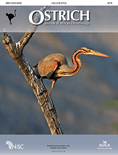
OSTRICH
Unveiling Insights in Avian Behavior and SystematicsOSTRICH, a distinguished journal published by Taylor & Francis Ltd, serves as a pivotal platform for disseminating research in the fields of ecology, evolution, behavior, and systematics. With an ISSN of 0030-6525 and an E-ISSN of 1727-947X, this journal has been contributing vital insights to the scientific community since its inception in 1930. Maintained in the UK, OSTRICH holds a respectable Q3 category ranking in the 2023 Ecology, Evolution, Behavior, and Systematics quartiles and ranks 408th out of 721 within its scientific domain according to Scopus, showcasing a competitive position within the 43rd percentile. OSTRICH is committed to publishing high-quality research that informs conservation efforts and biodiversity studies, making it an essential resource for researchers, professionals, and students interested in avian biology and related ecological fields. While not currently an open-access journal, OSTRICH offers varied access options through institutions and libraries, further widening its reach and impact within the scientific community. We invite academics and practitioners to explore its valuable articles that drive forward innovations in avian research.
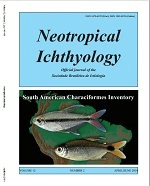
Neotropical Ichthyology
Driving insights into Neotropical fish conservation and ecology.Neotropical Ichthyology is a prestigious open-access journal published by the SOC BRASILEIRA ICTIOLOGIA, dedicated to advancing the field of ichthyology within the Neotropical region. Since its inception in 2003, the journal has provided a vital platform for researchers, professionals, and students to disseminate significant findings related to fish biology, ecology, and conservation. With an impact factor that is reflected in its impressive Q1 ranking in Animal Science and Zoology and Q2 rankings in both Aquatic Science and Ecology, Evolution, Behavior and Systematics, it stands as a leading resource for cutting-edge research. Located in Brazil, at the UNIV SAO PAULO, the journal not only contributes to scientific knowledge but also fosters collaboration among ichthyologists dedicated to the rich aquatic biodiversity of the Neotropical region, ensuring that critical insights into fish species, habitats, and conservation strategies are accessible to a global audience.

RAFFLES BULLETIN OF ZOOLOGY
Advancing Knowledge in Animal Science and EcologyRaffles Bulletin of Zoology, published by the National University of Singapore's Lee Kong Chian Natural History Museum, serves as a prestigious platform for the dissemination of cutting-edge research in Animal Science and Zoology, as well as Ecology, Evolution, Behavior and Systematics. With a current impact factor reflective of its Q2 category in both fields, this journal not only enhances its visibility in the academic community but also provides valuable insights into the complexities of biodiversity and conservation efforts. Covering a wide array of topics, Raffles Bulletin facilitates interdisciplinary collaboration and serves as an essential resource for researchers, professionals, and students alike. It is indexed in Scopus, ranking #233 out of 490 in Animal Science and Zoology and #406 out of 721 in Ecology, ensuring that the research published contributes significantly to the global discourse on wildlife and ecosystem management. Since its inception in 1996, this journal has bridged gaps in knowledge and continues to foster a deeper understanding of the living world.
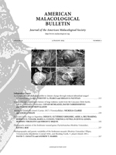
AMERICAN MALACOLOGICAL BULLETIN
A Global Platform for Malacological Excellence.American Malacological Bulletin is a distinguished journal published by the American Malacological Society, Inc., dedicated to advancing the field of malacology, which encompasses the study of mollusks and their ecological significance. Since its inception, the journal has provided a vital platform for the dissemination of research findings, reviews, and significant contributions from both established and emerging scholars. With an ISSN of 0740-2783 and an E-ISSN of 2162-2698, it holds a global reputation within its niche, albeit recognized within the Q4 category in both Aquatic Science and Ecology, Evolution, Behavior and Systematics based on its 2023 ranking. The bulletin's focus on fostering dialogue and collaboration among researchers around the world underscores its importance within the scientific community. As a resource housed in the Delaware Museum of Natural History, it actively contributes to the ongoing conversation on ecological conservation, biodiversity, and the evolving challenges facing marine ecosystems. Though not classified as an Open Access journal, it remains accessible to scholars and students eager to explore contemporary research in malacology.

VIE ET MILIEU-LIFE AND ENVIRONMENT
Exploring the Depths of Ecology and Aquatic ScienceVIE ET MILIEU - LIFE AND ENVIRONMENT is a pivotal journal in the realms of aquatic science and ecology, serving as a vital platform for researchers and professionals interested in the interconnections between living organisms and their environments. Published by the esteemed OBSERVATOIRE OCEANOLOGIQUE BANYULS in France, this journal has been disseminating valuable research since its inception in 1980, with volumes covering various topics pertinent to environmental dynamics through to 2024. Despite its current classification in the Q4 quartile for both aquatic science and ecology, the journal offers a unique opportunity for scholars to contribute to niche areas often overlooked by more prominent publications. VIE ET MILIEU is committed to fostering a comprehensive understanding of ecological interactions and the conservation of aquatic ecosystems, making it an essential resource for those engaged in environmental science and biology. Researchers can access a wealth of knowledge that supports their work, encourages collaboration, and inspires innovative approaches to pressing ecological issues.
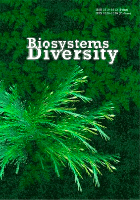
Biosystems Diversity
Connecting Scholars in the Quest for BiodiversityBiosystems Diversity is an esteemed open access journal published by the Oles Honchar Dnipro National University since 2009, based in Ukraine. Focusing on a wide array of topics within the fields of Ecology, Evolution, Behavior, and Systematics, the journal aims to foster the dissemination of cutting-edge research and innovative methodologies in understanding biodiversity and ecological interactions. With its ISSN 2519-8513 and E-ISSN 2520-2529, Biosystems Diversity has seen a consistent growth trajectory, earning a Q3 category for Ecology and a Q4 classification for Ecology, Evolution, Behavior and Systematics as of 2023, reflecting its dedication to high standards of scholarly excellence. The journal's rankings in Scopus solidify its relevance in the academic community, providing researchers and practitioners with vital insights into contemporary environmental challenges. As it converges towards its 2024 target, Biosystems Diversity continues to empower scientists, students, and professionals alike to explore new dimensions in the study of biological systems, offering crucial open access options for broader reach and engagement.
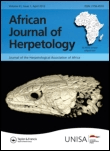
AFRICAN JOURNAL OF HERPETOLOGY
Empowering Researchers with Peer-Reviewed InsightsThe AFRICAN JOURNAL OF HERPETOLOGY, published by TAYLOR & FRANCIS LTD, serves as a pivotal resource in the field of herpetology, encompassing the study of reptiles and amphibians. With an ISSN of 2156-4574 and an E-ISSN of 2153-3660, this journal offers a platform for researchers to disseminate their findings and advance knowledge in this dynamic area of biology. Recognized in 2023 with a category quartile ranking of Q2 in Animal Science and Zoology and Q3 in Ecology, Evolution, Behavior, and Systematics, the journal highlights impactful research to a global audience. By providing access to robust, peer-reviewed content, the journal contributes significantly to ongoing debates and discoveries, thus appealing to academics, professionals, and students alike. The journal's converged publication years, spanning from 1996 to 2000 and from 2002 to 2024, signify a long-standing commitment to the field, ensuring that emerging trends and critical issues in herpetology remain at the forefront. Engaging with this journal not only enhances your understanding of amphibian and reptile biology but also connects you to a community dedicated to the conservation and sustainable management of these vital species.

MARINE AND FRESHWATER BEHAVIOUR AND PHYSIOLOGY
Illuminating Interactions in Aquatic EcosystemsMARINE AND FRESHWATER BEHAVIOUR AND PHYSIOLOGY, published by Taylor & Francis Ltd, is a renowned academic journal dedicated to advancing the understanding of the behavioral and physiological aspects of aquatic organisms. Established in 1994, the journal serves as a pivotal platform for researchers and professionals in the fields of Aquatic Science and Oceanography, offering valuable insights into the interactions between aquatic species and their environments. With an impact factor reflecting its significance in the academic community, it occupies a notable position in Category Quartiles, currently ranking Q3 in both Aquatic Science and Oceanography. Researchers are encouraged to explore a wide range of topics reflecting the complexity and diversity of marine and freshwater ecosystems. Although the journal is not open access, its contributions continue to influence both current research and future investigations, making it an essential resource for anyone engaged in the study of aquatic life.
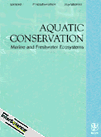
AQUATIC CONSERVATION-MARINE AND FRESHWATER ECOSYSTEMS
Connecting science and policy for aquatic conservation.AQUATIC CONSERVATION-MARINE AND FRESHWATER ECOSYSTEMS, published by WILEY, is a premier international journal dedicated to advancing the understanding of aquatic ecosystems and their conservation. With an impact factor reflecting its significant influence and a distinguished position in the Q1 quartile across key categories such as Aquatic Science, Ecology, and Nature and Landscape Conservation, this journal serves as an essential resource for researchers and professionals engaged in the study and protection of marine and freshwater environments. Covering a broad array of topics, from ecosystem management to conservation strategies, the journal encourages the dissemination of innovative research and interdisciplinary perspectives. Although it is not an open-access publication, this journal is esteemed for its rigorous peer-review process, facilitating a platform where vital research influences policy and practice in the aquatic sciences. Established in 1991, AQUATIC CONSERVATION continues to be a cornerstone in the academic exploration and safeguarding of aquatic ecosystems through to its converged years of 2024 and beyond, providing a critical lens for the future of environmental sustainability.
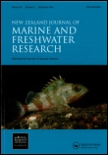
NEW ZEALAND JOURNAL OF MARINE AND FRESHWATER RESEARCH
Unveiling the Secrets of New Zealand's WatersNEW ZEALAND JOURNAL OF MARINE AND FRESHWATER RESEARCH, published by Taylor & Francis Ltd, stands as a distinguished platform for the dissemination of innovative research in the realms of aquatic science and ecology. With an ISSN of 0028-8330 and E-ISSN 1175-8805, this journal has been curating significant scientific contributions since its inception in 1967, continuing through to 2024. Recognized in the Q2 category across multiple relevant fields—including Aquatic Science, Ecology, and Water Science—this journal ranks notably in Scopus, with a 74th percentile for Ecology, Evolution, Behavior and Systematics, highlighting its impact and relevance within the scientific community. Though not an open-access publication, its rigorous peer-reviewed articles offer insights that resonate with researchers, professionals, and students who are passionate about advancing our understanding of freshwater and marine ecosystems. By fostering a collaborative space for ecological and environmental inquiries, the NEW ZEALAND JOURNAL OF MARINE AND FRESHWATER RESEARCH is essential for those aiming to contribute to the vital conversations around biodiversity, conservation, and sustainable management of aquatic resources.